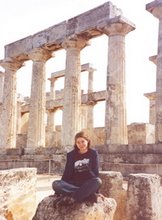
I realize that despite the fact that this blog is supposed to be about archaeology and baking, (however those two things may intersect...if they do at all), it's been pretty heavily weighted toward the baking end of things. So in an effort to focus a little more on archaeology, hopefully without completely boring those of you who are more interested in what I bake, I'm going to start from square one and present to you a little Q & A about archaeology. Here are many of the questions that I am often asked myself, along with a few I just made up.
What is archaeology?
Archaeology is the study of past human culture based on material remains. In other words, it is a way of learning about the lives of humans in the past by looking at what they left behind. We use many tools in this study, from written records, to artifacts (objects created or manipulated by humans), to preserved plant and animal remains.
So you guys just go out and dig in the dirt all day, right?
Not exactly. Excavation is only a small part of archaeology. In fact, the vast majority of archaeological work is done in the office, library, or laboratory and is much less glamorous than popular culture makes it seem. Most of the time archaeology looks like this: Sexy.
Sexy.
Before an archaeologist can dig, he or she has to do a great deal of preliminary research. And after the excavation is over, there are artifacts to deal with, data to analyze, and reports to write and publish.
And when we're "out in the field", archaeologists do more than just dig. Mapping, surface survey, and remote sensing (survey with fancy machines) are all ways that archaeologists gather data. Digging is just one of many methods we can use.
Is archaeology a real job? I thought it was just something you study in school.
Believe it or not, you can make a living as an archaeologist. Most archaeologists in the United States work in cultural resource management (CRM). CRM is a field devoted to the protection and management of our nation's cultural resources (archaeological sites, artifacts, historic properties, etc) in the face of a growing and expanding population and rampant development.
Many other archaeologists are educators- teachers and university professors. In addition to teaching courses, they also research, write, and do fieldwork. And of course some archaeologists work in museums, as curators, educators, and exhibit designers.
Do archaeologists dig up dinosaurs?
No. Those are paleontologists.
But I thought--
No.
What does archaeology have to do with baking?
Very little, as far as I can tell. They are just two of my favorite things, and I like to talk about them both. I guess I could study what people baked in the past, or bake ancient recipes (or brew ancient beer), or eat really old food...but let's not get crazy here.
I hope our little conversation has been helpful. I'm always open to more questions, so feel free to ask. And if you're looking for some more interesting archaeology-related stuff, here are some links:
Archaeology education
Archaeology 101 from the Archaeological Institute of America: A good introduction to archaeology, plus a handy glossary, bibliography, and review of archaeology-related tv shows and movies.
Archaeology Magazine's Interactive Digs: Black Sea shipwrecks, Civil War prisons, George Washington's distillery (!), and more!
Archaeology Education from Ohio State University: A basic, but thorough, introduction to such topics as archaeological survey, excavation, and Greek history and archaeology.
Blogs
My pal Bill's blog started out this summer as a chronicle of his archaeological project on Cyprus, so look at the early posts if you want to know what it's like to plan and implement this kind of project. Now he blogs about everything from Byzantine churches to travel in Greece to the history of the University of North Dakota.
Shameless plug: Read about my adventures on an archaeological project in Greece this past summer.
- Part 1: Finally, Greece! (intro)
- Part 2: Greece (about the project)
- Part 3: A day in the life (daily life on the project)
- Part 4: Greek Wine, Rose Jam, and Pigs: Travel in the Peloponnese
Archaeology & Food
The Trouble With Blood: Julie Powell takes on ancient cooking (full article not available online, unfortunately- but the recipes are! I dare someone to make the lamb liquor.)
Moche Foodways Archaeological Project






2 comments:
Maddy,
This is really funny! We'll get back to providing blow-by-blow project blog posts in the build up to the summer field season.
Bill
Thanks Bill! I look forward to updates on your field project- but I'm certainly enjoying your interim blog posts as well.
Post a Comment